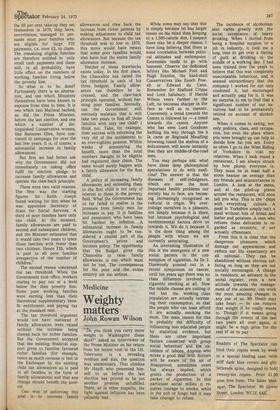Medicine
Weighty matters
John Rowan Wilson
'rbo you think you carry more weight in Washington these days?" asked an interviewer of the Prime Minister on his return from his recent visit to the US.
, Television is a revealing medium and alas, the question was unnecessary. That slimline Mr Heath who presented himself to us before the last election has proved to be yet another promise unfulfilled. There, as in other respects, the fight against inflation has been palpably lost. While some may say that this is simply because he has larger issues on his mind than keeping to a 1,500-calorie diet, I suspect there may be a deeper reason. I have long believed that there is some correlation between political attitudes and embonpoint. Extremism tends to go with leanness. Observe the dedicated leftists like Michael Foot and Hugh Scanlon, the hard-shell Conservatives like Enoch Powell or Edward du Cann. Remember Sir Stafford Cripps and Lord Salisbury. If Harold Wilson veers further to the Left, he becomes sharper in the face as well as in manner. Conversely, a trend towards the Centre is followed by — a trend towards the centre. Anyone who has seen Lord Goodman bashing his way through the a la carte or Reginald Maudling browsing round the shelves of a delicatessen will know instantly that they are middle-of-the-road men.
You may perhaps ask: what have these deep philosophical speculations to do with medicine? The answer is that the diseases of self-indulgence, which are now the most important health problems our society has to face, are becoming increasingly recognised as cultural in origin. We overindulge ourselves in a pleasure, not simply because it is there, but because psychological and environmental factors drive us towards it. We do it because it is the done thing among the people with whom we are currently associating.
An interesting illustration of this is the emergence of a new social pattern in the consumption of cigarettes. As Dr J. Dunwoody pointed out in a recent symposium on cancer, until ten years ago there was no class difference involved in cigarette smoking at all. Now the middle classes are cutting it out but the working class population are actually increasing their consumption, so that the people who can least afford it are actually smoking the most. The main reason for this is probably the difficulty of influencing less educated people by statistical evidence, but there are other important factors connected with group social behaviour and the existence of taboos. Anyone who mixes a good deal With doctors will be aware of the air of disapproval, sometimes overt but always implied, which greets the production of a packet of cigarettes. In this particular social milieu it requires courage to smoke, while in the pub or bingo hall it may take courage to refuse. The incidence of alcoholism also varies greatly with the social acceptance of heavy drinking. When I moved from being a hospital surgeon to a job in industry, it took me a long time to get over a feeling of guilt at drinking in the middle of a working day. I had been trained over the years to believe that this was completely unacceptable behaviour, and it seemed extraordinary that the company I worked for not only condoned it, but encouraged and actually paid for it. It was no surprise to me to find that a significant number of our excutives had to be prematurely retired on account of alcoholism.
When it comes to eating, not only politics, class, and occupation, but even the place where you were brought up can help to decide how fat you are. Every so often I go to the West Riding of Yorkshire to visit my relatives. When I look round a restaurant, I am always struck by how plump everyone is. They must be at least half a stone heavier on average than my friends and acquaintances in London. A look at the menu, and at the piled-up plates around the restaurant, will soon tell you why. This is the chips with everything' culture. A meal in Yorkshire simply isn't a meal without lots of bread and butter and potatoes. A man who refuses these delicacies is regarded as eccentric, if not actually effeminate.
From this it is clear that the dangerous pleasures which damage our appearances and reduce our life expectancy are all optional. They can be abandoned without obvious suffering so long as they are not socially encouraged. A change in residence, an advance in the social register, even a new attitude towards the management of the economy, can work the most amazing changes in any one of us. Mr Heath may take heart — he can remove that weight if he really wants to. Though if it means ,going through the events of the last two years all over again, it might be a high price for the rest of us to pay.


































 Previous page
Previous page